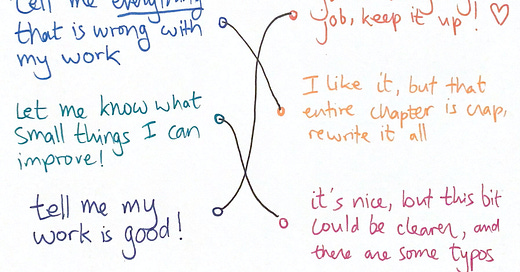Hi there!
Welcome to issue #13 of Light Gray Matters, the newsletter about whatever I’m thinking of on the day I send it. Today, that happens to be advice.
In other words, I’ll give advice about giving advice. Meta-advice.
(If you want just regular, non-meta advice, then I shall advise you to subscribe if haven’t already, and share the newsletter with all your wonderful friends. You can use these buttons to do so:
This piece of life-changing advice was free. No, no need to thank me.)
When should you give advice? It’s probably safe to say, “when you’re asked for it.” Receiving advice when we don’t want to can be super annoying.
But even when you are asked for advice, should you give it?
(Oh, I guess no one asked me for the advice in this newsletter. Well, by reading on, you agree to the terms and conditions, i.e. that you want to read meta-advice from me. You’ve been warned.)
I’ve been thinking about this after my partner asked me for feedback on one of his comic strips before publishing it. I’m no comic artist, but I could nonetheless spot multiple opportunities for improvement. For example, something wrong with the shadows.
the shadows are all wrong! (in this extremely bad attempt at making a visual representation of the work of someone who’s way better than me at drawing)
And then I wondered: should I point that out?
You see, making a comic strip takes a rather long time. And when you create, you need to know when to stop. If you’re just making a small comic for your Instagram, you don’t want to spend hours and hours on it. You don’t need to iron out all the imperfections.
If I point out some very non-critical detail about the shadowing of a scene, I may be putting the creator in a tough spot. Now he’s aware of it. He would feel bad about publishing work with an imperfection. But redrawing to correct the mistake is clearly not worth the time — most people wouldn’t even notice.
So whenever I give my partner feedback, I now tend to add caveats of the kind:
Well, you know, I noticed a thing… but, like, it’s not important, I don’t want you to waste any time with it, but I DID notice a thing, so I feel compelled to tell you, but it’s fine if you don’t want to change it! Actually, DON’T change it! Not worth it! But, you know… The shadows are wrong, here. And here. And here.
Maybe I shouldn’t feel bad about this. If someone asked me for feedback, then shouldn’t I feel free to say anything?
Well, it really depends on what the asker wants.
First situation: you’re creating something super important. A book, maybe. Or a song for a show that millions will watch. Or a letter of motivation for your dream job. In those cases, you want a lot of really stringent criticism. No imperfections shall pass! You want the best possible version of your work.
In fact, you’d be angry if a friend refrained from pointing out a mistake because they didn’t want you to feel bad. Or, god forbid, if they just generically said “yeah, it’s good!” while you know very well many things could be improved.
Second situation: what you’re making isn’t that serious. You want someone to proofread to catch the typos, perhaps, or catch the most egregious mistakes, but you don’t want to go over multiple rounds of intense feedback.
This is the approach I’m taking with this newsletter. Being prolific and regular is more important than achieving A+ quality. I could submit it to one of the excellent writing groups I’m part of, collect feedback from a dozen competent readers, and then work for days to incorporate their advice and make it amazing… But it’s not what I want on this medium. It’s too much work; I’ll keep that for my (now vanishingly rare…) blog essays, and for my book.
Third situation: you’re not really asking for feedback — you’re asking for validation. You’re not really interested in precise, thoughtful advice. You just want to hear that you did a good job. You just need the motivation.
This is fine! Validation is great, and motivation is the most precious thing. There’s no shame in getting it however we can.
But make sure you’re clear that it’s what you want. If you’re looking for validation and you get soul-crushing criticism, you may, well, get your soul crushed. Not fun for any of the parties involved.
Thus the central point of this essay: the person asking for advice should know what their expectations are, and should do their best to communicate them to the person they’re asking.
Make sure you get the wires connected right! And realize that it’s a job for both sides. Advice-givers can’t guess the expectations of advice-askers, and advice-askers can’t know in advance what kind of advice they’ll get (otherwise they wouldn’t ask for advice at all!).
Aaaand that’s my piece of meta-advice for tonight. Meanwhile, I remain
Feedback-givingly yours,
Étienne
Salon: Babel
As promised last week, here are some more details on my upcoming Salon! We’re going to talk about language and, more specifically, language diversity. What does the multitude of languages in the world mean for society and for us specifically?









Some other articles on advice: it has to be both actionable and valid https://atis.substack.com/p/most-advice-is-pretty-bad?s=r
Some other articles on taking advice: "Beating the odds" is a bad assumption, so they need to get hurt first https://hardfork.substack.com/p/why-most-founders-dont-take-good?s=r
This piece brought to mind a funny story I heard Neil DeGrasse Tyson tell. He noticed in the movie Titanic that the night sky was wrong in one of the scenes and it bugged him. He wrote a letter to him and never heard back. Years later, he ended up sitting next to the director James Cameron at a dinner gala thing and he couldn't resist pointing it out again. James heard him out and then said, "Last I checked, Titanic made $(some insane amount of money). Imagine how much more it would've made if we got the night sky right." I guess they eventually did some sort of re-release of the film later on and contacted Neil to get it right though, so Neil got the last laugh. https://youtu.be/8B6jSfRuptY